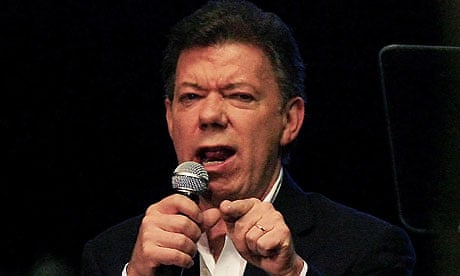Hugo Chávez and his new counterpart in Colombia, Juan Manuel Santos, are to meet tomorrow to defuse a diplomatic crisis over allegations that Venezuela is harbouring Colombian guerrillas.
The two leaders agreed to talks to try to end a festering dispute which has poisoned relations between their countries and rattled the rest of South America.
The rapprochement followed Santos's inauguration on Saturday and raised hopes that diplomatic ties and cross-border trade would be revived even if the main issue – whether Caracas has been aiding Colombia's rebels – remained unresolved.
The apparent breakthrough was overshadowed today by the new Colombian vice-president's heart attack just two days into the job. Doctors said Angelino Garzón, 64, was conscious and stable and awaiting emergency surgery.
Venezuela's foreign minister, Nicolás Maduro, and his opposite number in Colombia, María Angela Holguín, brokered the presidential meeting on the sidelines of the inauguration in Bogotá.
Santos, a former defence minister who won in a landslide election, said he hoped the meeting would normalise relations. Chávez said he was "happy" at that prospect: "We are going to start a new relationship for the good of both countries."
The decision to send Maduro to Bogotá was a surprise given weeks of insults between Chávez and Colombia's outgoing president, Alvaro Uribe. The conservative hardliner, who over the years often clashed with Venezuela's socialist leader, triggered the latest row last month by accusing his neighbour of cosseting terrorists.
At a special session of the Organisation of American States, Colombia presented videos, photos and maps purportedly proving that 1,500 fighters from the Revolutionary Armed Forces of Colombia (Farc) and a smaller leftist group, the ELN, had camps just inside Venezuela.
Chávez denied the allegations and severed diplomatic ties with Bogotá. There is no doubt armed Colombian groups operate in Venezuela: ranchers, clerics, mayors and army officers, among others, testify to kidnappings and extortion by guerrillas, militias and criminal gangs in the border states of Apure, Tachira and Zulia. The question is how many, and whether elements of Venezuela's government support some of them.
Chávez, a self-styled socialist revolutionary, has in the past professed admiration for Farc and called it a legitimate army. The US and EU calls the group drug-trafficking terrorists.
Yesterday, however, Chávez repeated calls for the rebels to release hostages and to negotiate an end to their decades-long insurgency. "Just as one proposes that Colombia's government seek the path to peace, the guerrillas also must do it ... They have no future by staying armed."
Uribe was unimpressed by the olive branch and said he was willing to testify against Chávez in a case to be brought before the international criminal court by Colombian victims of guerrilla violence. A spokesman said the former president would testify in a private capacity but draw on privileged information from his eight years in office.
But his successor was clearly keen to end a row which has hit cross-border trade, slowed Colombia's economic recovery and fuelled Venezuela's galloping inflation.
"For Santos (this is) a huge break with Uribe," said Adam Isacon, a Colombia specialist at the Washington Office on Latin America thinktank. The new president had several reasons, he said. "If diplomacy works better than threats to convince Chávez to break with the Farc and deny them safe havens, it's absolutely worth a try."
If diplomacy failed Santos could tell the international community he offered a hand of friendship and it was slapped away. In addition, calming tensions would deprive Chavez of a useful political distraction in the run-up to legislative elections set to be dominated by Venezuela's economic travails.
Turbulent past
Venezuela and Colombia share a 1,375-mile border and volatile history. Both were part of a short-lived nation known as Gran Colombia that included Ecuador and Panama after Simón Bolívar expelled Spanish rule in the 19th century. The dream of continental unity died amid squabbling by the victorious generals.
Colombia's four-decade guerrilla conflict has for years spilled into Venezuela in the form of kidnappings, smuggling and drug trafficking.
Hugo Chávez, a self-described Marxist, has at times lauded the Marxist guerrillas but denies providing arms or logistical support. Toxic personal chemistry with Colombia's former president, Álvaro Uribe, further strained ties. Chávez has frequently recalled Venezuela's ambassador from Bogotá and accused Colombian hitmen of plotting his assassination.
Chávez ordered 10 tank battalions to the border in 2008 after Colombia bombed a rebel camp in Ecuador, but few took the threat of war seriously. The row ended in hugs days later.
